ISTANBUL: The Turkish government on Tuesday postponed until 2025 a parliamentary debate on a proposed tax on credit cards, which it sought to fund the arms industry as conflict rages in its neighborhood.
Indignant Turks, who already face double-digit inflation, called their banks to lower their credit limits after the governing AKP party submitted the tax bill to parliament on Friday.
After the public outcry, the AKP announced Tuesday that it was delaying debating the bill until next year.
“There were certain objections from our citizens, we will examine all of this in detail,” said the AKP’s parliamentary group chairman, Abdullah Guler.
“We have postponed our discussions and we will reconsider, after the budget, if there are some points to change or remove,” he said.
The proposed legislation came as Israel’s conflicts with Tehran-backed Islamist militants in Gaza and Lebanon, and missile strikes by Iran, have raised global concerns that a broader war could erupt in the Middle East.
“Our country has no choice but to increase its deterrent power. There’s war in our region right now. We are in a troubled neighborhood,” Finance Minister Mehmet Simsek told private broadcaster NTV earlier on Tuesday.
The bill stipulated that people with a credit card limit of at least 100,000 liras (nearly $3,000) would have to pay an annual 750 lira ($22) in tax from January to bolster the defense industry.
“If we increase our deterrent power, then our ability to protect against fire in the region will increase,” Simsek had said, though he added that the bill was in the hands of parliament and that the AKP, could “re-evaluate” it.
When he proposed the tax on Friday, Guler said that Israel’s next target would be Turkiye, an argument often cited by President Recep Tayyip Erdogan.
A vocal critic of Israel’s offensive in Gaza and Lebanon, Erdogan doubled down on the threat posed by Israel when addressing a conference hosted by his AKP party on Tuesday.
“Even if there are those who cannot see the danger approaching our country... we see the risk and take all kind of measures,” he said.
Turkiye’s defense industry has enjoyed a boom in recent years but Simsek said the sector still needed a boost.
The defense industry is planning to invest in 1,000 projects, including an air defense system that would protect Turkiye from missile assaults, Simsek said.
Turkiye allocated 90 billion lira from the budget to fund the defense industry last year, he added.
“This year, we increased it to 165 billion lira. Maybe we will need to double this even more.”
Turkiye’s defense companies signed contracts in 2023 worth a total of $10.2 billion, according to Haluk Gorgun, the head of Turkiye’s state Defense Industry Agency (SSB).
The top 10 Turkish defense exporters contributed nearly 80 percent of total export revenue, he said.
Sales of Turkish Baykar drones, used in Nagorno-Karabakh or Ukraine, amounted to $1.8 billion.
Last week, parliament held a closed-door session for the government to explain why it saw Israel as a potential threat, but the opposition said it was not convinced.
The spokesman for Turkiye’s main opposition CHP party, Deniz Yucel, said Monday that the government was exploiting nationalist feelings to sweep an “economic crisis” under the carpet.
Inflation has spiralled over the past two years, peaking at an annual rate of 85.5 percent in October 2022.
Official data showed it had slowed to 49.4 percent in September.
“The AKP is trying to create a fake ‘foreign threat and war agenda’ with the rhetoric of ‘Israel may attack us’,” Yucel said.
“We know and see that they are trying to disguise the economic crisis they caused.”
Turkish government delays tax plan to fund defense industry
https://arab.news/vuzyf
Turkish government delays tax plan to fund defense industry

- The bill stipulated that people with a credit card limit of at least 100,000 liras (nearly $3,000) would have to pay an annual 750 lira ($22) in tax from January to bolster the defense industry
Gaza ceasefire sees its smoothest exchange yet of Israeli hostages for Palestinian prisoners

- Militants handed Argentinian-Israeli Yarden Bibas and French-Israeli Ofer Kalderon to Red Cross officials in the southern city of Khan Younis, while American-Israeli hostage Keith Siegel, looking pale and thin, was handed over in Gaza City
KHAN YOUNIS, Gaza Strip: The ceasefire in Gaza saw its smoothest exchange yet of Israeli hostages for Palestinian prisoners on Saturday, and the crucial Rafah border crossing reopened two days before discussions on the truce’s far more difficult second phase begin.
And Israeli Prime Minister Benjamin Netanyahu will meet with US President Donald Trump at the White House on Tuesday, giving him a chance to showcase his ties to Israel’s closest ally and press his case for what should come next after 15 months of war.
The ceasefire’s second phase calls for the release of remaining hostages and an indefinite extension of the truce in the deadliest and most destructive war ever between Israel and Hamas. The fighting could resume in early March if an agreement isn’t reached.
Netanyahu’s office said he spoke Saturday evening with Trump’s Middle East envoy Steve Witkoff. They agreed that negotiations on the second phase will begin at their meeting Monday, and Witkoff later in the week will speak with the other mediators, Qatar and Egypt.
Hamas on Saturday freed three male hostages, and Israel released 183 Palestinian prisoners in the fourth such exchange. Another exchange is planned for next Saturday.
Militants handed Argentinian-Israeli Yarden Bibas and French-Israeli Ofer Kalderon to Red Cross officials in the southern city of Khan Younis, while American-Israeli hostage Keith Siegel, looking pale and thin, was handed over in Gaza City.
All three were taken during the Oct. 7, 2023, Hamas-led attack on Israel that sparked the war. Eighteen hostages have now been released since the ceasefire began on Jan. 19.
The latest releases were quick and orderly, in contrast to chaotic scenes on Thursday when armed militants appeared to struggle to hold back a crowd. On Saturday, the militants stood in rows as the hostages walked onto a stage and waved.
Hamas has sought to show it remains in control in Gaza even though a number of its military leaders have been killed.
A bus later departed Ofer Military Prison with over two dozen Palestinian prisoners bound for the Israeli-occupied West Bank. Jubilant crowds cheered and hoisted the prisoners on their shoulders. Many appeared frail and thin.
The Israeli Prison Authority said all 183 prisoners set for release had been freed. In another sign of progress in the ceasefire, they included 111 who were arrested after Hamas’ Oct. 7 attack but who weren’t involved in it. They had been held without trial and were released to Gaza. Seven serving life sentences were transferred to Egypt.
Joy and relief, but fears for those still held
Siegel, 65, originally from Chapel Hill, North Carolina, was taken hostage from Kibbutz Kfar Aza, along with his wife, Aviva, who was released during a brief 2023 ceasefire.
There were sighs of relief and cheers as kibbutz members watched Siegel’s release.
“You can see that he’s lost a lot of weight, but still he’s walking and talking and you can feel that it’s still him. And one of the first things he told us is that he’s still vegan,” said Siegel’s niece, Tal Wax.
The release of Bibas, 35, brought renewed attention to the fate of his wife, Shiri, and their two sons, Ariel and Kfir, who were 4 years old and 9 months old when they were abducted from Kibbutz Nir Oz.
Kfir was the youngest of the roughly 250 people who were taken captive on Oct. 7, and his plight came to represent the helplessness and anger in Israel.
Israel expressed “grave concern” for Bibas’ wife and children and pleaded with negotiators to provide information. Hamas has said they were killed in an Israeli airstrike, but Israel has not confirmed it.
After his release, Bibas closed his eyes as his father, Eli, and sister Ofri hugged him and cried. “Sweetheart,” his father said.
“A quarter of our heart has returned to us,” the Bibas family said in a statement.
Kalderon, 54, was also captured from Kibbutz Nir Oz. His two children, Erez and Sahar, were taken alongside him and released during the earlier ceasefire.
“I am here. I am here. I didn’t give up,” Kalderon said as they embraced.
There were similar scenes among the released Palestinians.
“Certainly, it’s an indescribable feeling, and undoubtedly a mixed feeling of both sadness and joy, as we have left our brothers in captivity,” said Mohammad Kaskus, who had been sentenced to 25 years over attacks against Israelis.
Yaser Abu Hamad, arrested for involvement in the Islamic militant group in 2006, found that 20 family members including his mother and sisters had been killed by Israeli airstrikes during the war. He visited their graves.
Palestinians who had been sentenced over their connection to deadly attacks against Israelis described harsh conditions, beatings and other abuse in prison. The Israeli Prison Authority didn’t immediately respond to a request for comment.
Ceasefire brings respite to battered Gaza
The ceasefire has held for two weeks, allowing for hundreds of trucks of aid to flow into the tiny coastal territory and for hundreds of thousands of Palestinians to return to shattered homes in northern Gaza.
And on Saturday, 50 sick and wounded Palestinian children were leaving Gaza for treatment through the Rafah border crossing to Egypt as the enclave’s sole exit opened for the first time since Israel captured it nine months ago.
During the ceasefire’s six-week first phase, 33 Israeli hostages are to be freed in exchange for nearly 2,000 Palestinian prisoners. Israel says it has received information from Hamas that eight of those hostages are dead. About 80 hostages remain in Gaza.
“We will not allow you to blow up this deal. We will not allow you to force us back into war or to sentence the hostages left behind to death,” Naama Weinberg, cousin of deceased hostage Itay Svirsky, told a weekly gathering in Tel Aviv, addressing the warring sides.
Israel says it is committed to destroying Hamas. The militant group says it won’t release the remaining hostages without an end to the war and a full Israeli withdrawal from Gaza.
About 1,200 people, mostly civilians, were killed in the attack that sparked the war. More than 47,000 Palestinians have been killed in Israel’s retaliatory air and ground offensive, over half women and children, according to Gaza’s Health Ministry, which doesn’t say how many of the dead were militants.
The Israeli military says it killed over 17,000 fighters, without providing evidence. It blames civilian deaths on Hamas because its fighters operate in residential neighborhoods.
Palestinian ministry says Israeli forces kill 5 in West Bank

- "After the strike that killed the child (Sadi), an Israeli drone strike hit a car in Qabatiya and killed two youths," Jenin governor Kamal Abu al-Rub told AFP
RAMALLAH, Palestinian Territories: The Palestinian health ministry said Israeli forces killed five people in separate strikes on Saturday in the Jenin area of the occupied West Bank, where they are conducting a major offensive.
An Israeli air strike on an eastern neighbourhood of Jenin killed 16-year-old Ahmad al-Sadi and critically wounded two other people, the ministry said.
A second strike targeted a car, killing two people in the nearby town of Qabatiya, the ministry said, while a third killed two people in central Jenin.
"After the strike that killed the child (Sadi), an Israeli drone strike hit a car in Qabatiya and killed two youths," Jenin governor Kamal Abu al-Rub told AFP.
"Minutes later another drone strike in Jenin killed two more youths who were on a motorcycle."
The Israeli military confirmed it struck a car in the Qabatiya area.
"As part of the counterterrorism operation in northern Samaria (the far north of the West Bank), an Israeli Air Force aircraft... struck a vehicle with terrorists inside in the area of Qabatiya," it said.
When asked about the strike that killed Sadi, the military told AFP that the air force "struck armed terrorists in the Jenin area".
Last month, the Israeli military launched an assault dubbed "Iron Wall" aimed at rooting out Palestinian militant groups from the Jenin area of the West Bank.
Jenin and its adjacent refugee camp have long been a hotbed of Palestinian militancy and violence there and across the territory has soared since the Gaza war broke out in 2023.
Israeli troops or settlers have killed at least 881 Palestinians, including many militants, in the West Bank since the start of the war, according to the Palestinian health ministry.
At least 30 Israelis have been killed in Palestinian attacks or Israeli military raids in the territory over the same period, according to Israeli official figures.
On Thursday, the Palestinian health ministry said Israeli forces had killed two Palestinians in Jenin after the military announced a soldier had also been killed.
‘Jordan: Dawn of Christianity’ exhibition opens in Rome

- Display will promote Jordan’s religious heritage to global audience
- Event coincides with Vatican’s Jubilee Year, themed ‘Pilgrims of Hope’
LONDON: Visitors to the “Jordan: Dawn of Christianity” exhibition, now open in Rome, will gain a rare insight into Jordan’s deep-rooted and wide-ranging religious history.
The exhibition, which opened on Friday and runs to Feb. 28, coincides with the Vatican’s Jubilee Year, themed “Pilgrims of Hope,” and aims to raise awareness of Jordan’s Christian heritage among Italian and international visitors.
It focuses on Bethany Beyond the Jordan (Al-Maghtas), believed to be baptism site of Jesus Christ, and Jordan’s longstanding efforts to preserve religious history under Hashemite leadership.
The opening ceremony was attended by Jordan’s Minister of Tourism, Lina Annab, and Ambassador to Italy Qais Abu Dayyeh, as well as officials from the Ministry of Tourism and Antiquities, the Jordan Tourism Board, and the Department of Antiquities, along with a delegation from the senate, and international media representatives.
Showcasing more than 90 rare artifacts, the exhibition features intricate mosaics, ancient Christian symbols, and interactive historical narratives spanning from the baptism of Christ in the Jordan River to the Byzantine and Islamic periods and into the modern Hashemite era.
Speaking at the event, Annab underscored the exhibition’s role in promoting Jordan’s Christian and Islamic heritage to a global audience.
“This initiative reflects Jordan’s deep-rooted religious and cultural history, highlighting the country’s efforts under His Majesty King Abdullah II’s leadership to preserve Christian presence in the region as an integral part of our shared heritage,” she said.
The exhibition also commemorates the 25th anniversary of Pope John Paul II’s recognition of Bethany Beyond the Jordan as a Christian pilgrimage site.
How Syria’s food insecurity threatens national and regional stability

- With more than half of Syria’s population facing food insecurity, experts call for reform and regional cooperation to prevent further conflict
- Assad’s fall brought hope, but hunger has worsened for millions as violence, looting, and war damage disrupt food supplies
LONDON: More than half of Syria’s population faces food insecurity as the country grapples with the aftermath of 13 years of civil war, the abrupt collapse of Bashar Assad’s regime, and a surge of returnees.
Inadequate funding for aid organizations during this political transition risks deepening and prolonging the crisis.
A recent report by the Food Security Cluster, a UN-led coordination group, revealed that 14.5 million people in Syria are food insecure, including 9.1 million facing acute food insecurity and 5.4 million at risk of hunger.

The report, published on Jan. 25, emphasized that Syria’s sudden power shift and ongoing political transition have increased pressure on its fragile food systems, reshaping humanitarian needs.
Rola Dashti, executive secretary of the UN Economic and Social Commission for Western Asia, described the current phase in Syria as a “critical juncture,” stressing that the country must either move toward reconstruction and reconciliation or risk falling into deeper chaos.
“The stakes for the country, and for the region, could not be higher,” she said in a January statement.
“Food insecurity is rampant, healthcare systems are crumbling, and entire communities have been uprooted. This is one of the world’s most protracted humanitarian crises, and our findings make clear it could get worse if immediate steps are not taken.”

On Dec. 8, a coalition of opposition groups led by Hayat Tahrir Al-Sham seized control of Syria’s capital Damascus, following a sweeping 12-day offensive that toppled Assad.
And although Assad’s ouster provided some relief to Syrians, it also plunged the country into fresh political and economic uncertainty, with the country deeply fractured and up to 1 million refugees expected to return by June, according to UN figures.
Recent clashes have sparked a new wave of displacement, with some 1.1 million people newly displaced, mainly in Idlib, Aleppo, Homs, and Hama.
The surge in violence since late November has been a major driver of food insecurity, according to the Food Security Cluster’s report. Warehouses and public services have been looted, while damage to agricultural infrastructure has disrupted the planting season.
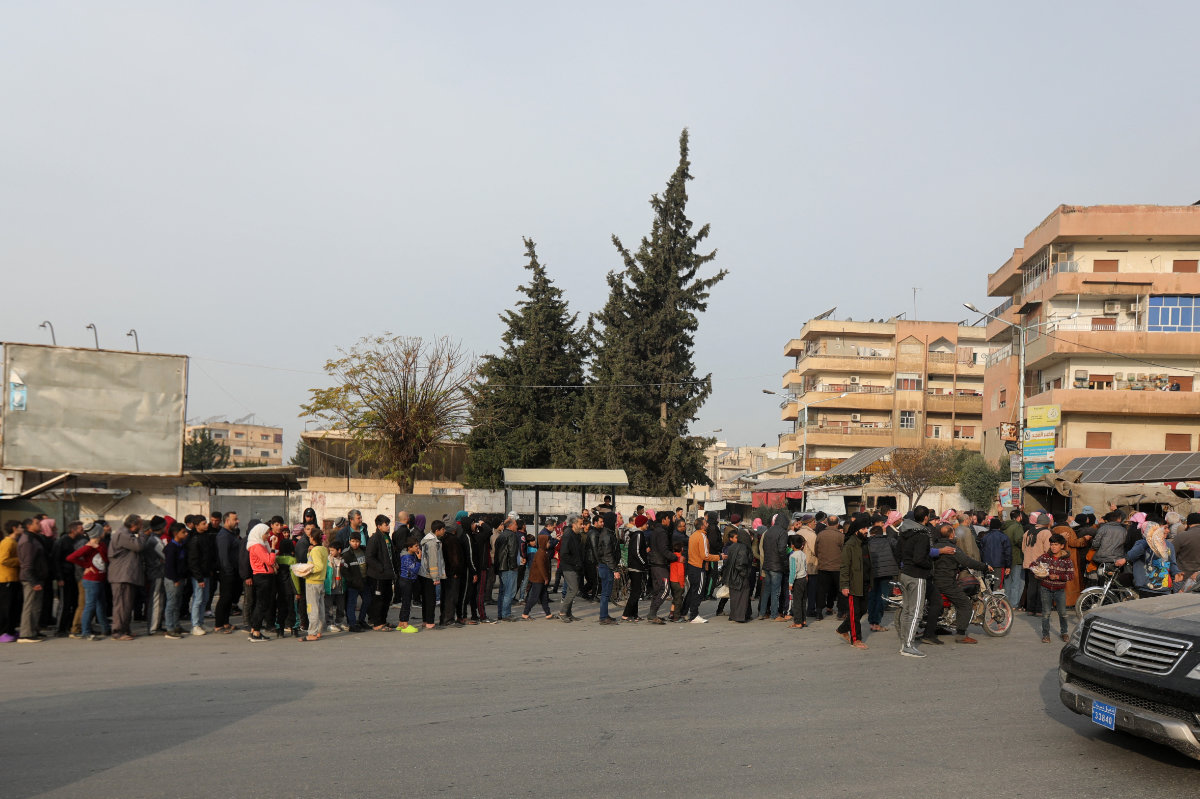
This lawlessness, especially in northeastern and southern Syria, has created logistical challenges, blocked roads, and restricted aid access, severely disrupting food security.
Some 90 percent of Syrians currently live below the poverty line and some 16.7 million need humanitarian assistance, according to the UN.
Without bold reforms and swift international support, these needs are expected to grow, ESCWA warns.

The Food Security Cluster said $560 million is needed to fund a three-month emergency response providing food assistance and livelihood support during Syria’s political transition and uncertainty.
However, funding for aid remains insufficient. Cindy McCain, director of the World Food Programme, has said that some governments are reluctant to increase support for urgent humanitarian needs in Syria under the country’s new interim rulers.
And although the new leadership in Damascus has pledged a radical overhaul of the struggling economy, including privatization and public sector job cuts, it faces enormous challenges.
Western sanctions and more than a decade of conflict have left Syria’s economy in tatters. The country’s gross domestic product has contracted by 64 percent since the beginning of the war in 2011, according to a recent ESCWA report.
The report, released in late January, noted that Syria’s currency lost nearly two-thirds of its value against the US dollar in 2023 alone, driving consumer inflation to an estimated 40.2 percent in 2024.

Joshua Landis, director of the Center for Middle East Studies at the University of Oklahoma, believes the collapse of the Assad regime is largely tied to the failure of Syria’s economy.
“Government pay for officers in the army was $30 a month, and only $10 for enlisted men, which gives one a sense of the terrible need,” he told Arab News.
“The HTS government has increased those government wages by 400 percent, thanks to the largesse of Qatar, but wages remain extremely low.”
In mid-December, Syria’s interim government announced plans to dramatically increase the salaries of public servants. However, this plan involves laying off a third of the state workforce, Reuters reported.
The first wave of layoffs came just weeks after Assad’s ouster. Ministers in the interim government told Reuters that removing “ghost employees” — those who received salaries for doing little or nothing — was part of a crackdown on waste and corruption.
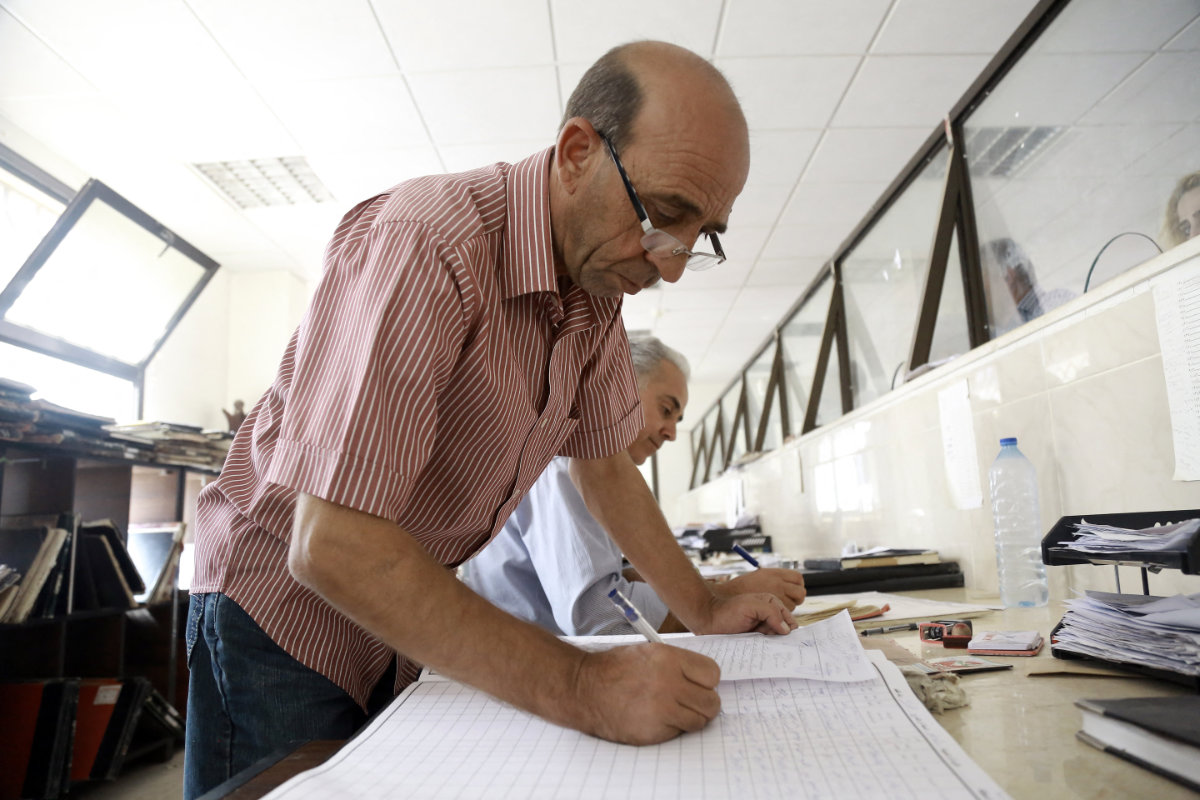
Landis says the layoffs are likely to worsen the hunger crisis for certain groups.
“Employees of the old regime are quickly being purged, as new employees whose ambitions and loyalties are better aligned with the new government are recruited by HTS,” he said.
“This means that hunger and insecurity is being redistributed to those Syrians who used to be favored by the Assad regime.”
Residents of Damascus and its hinterlands say that while the capital has seen an influx of foreign goods and a drop in prices since Assad’s departure, purchasing power remains low, especially as public servants and many private sector workers have not been paid in two months.
“We have a saying in Syria: a camel costs only one pound, but we don’t have that pound,” Umm Samir, a 55-year-old housekeeper from Al-Hajar Al-Aswad, Rif Dimashq, told Arab News.
“Prices of food have certainly dropped, and there are no shortages,” she said. “But in our area, many have not brought a pound home for almost two months.”
She added: “For example, a bottle of olive oil cost 100,000 Syrian pounds before Dec. 8; now it’s sold for 75,000. A kilogram of sugar was 20,000; now it’s 9,000.”
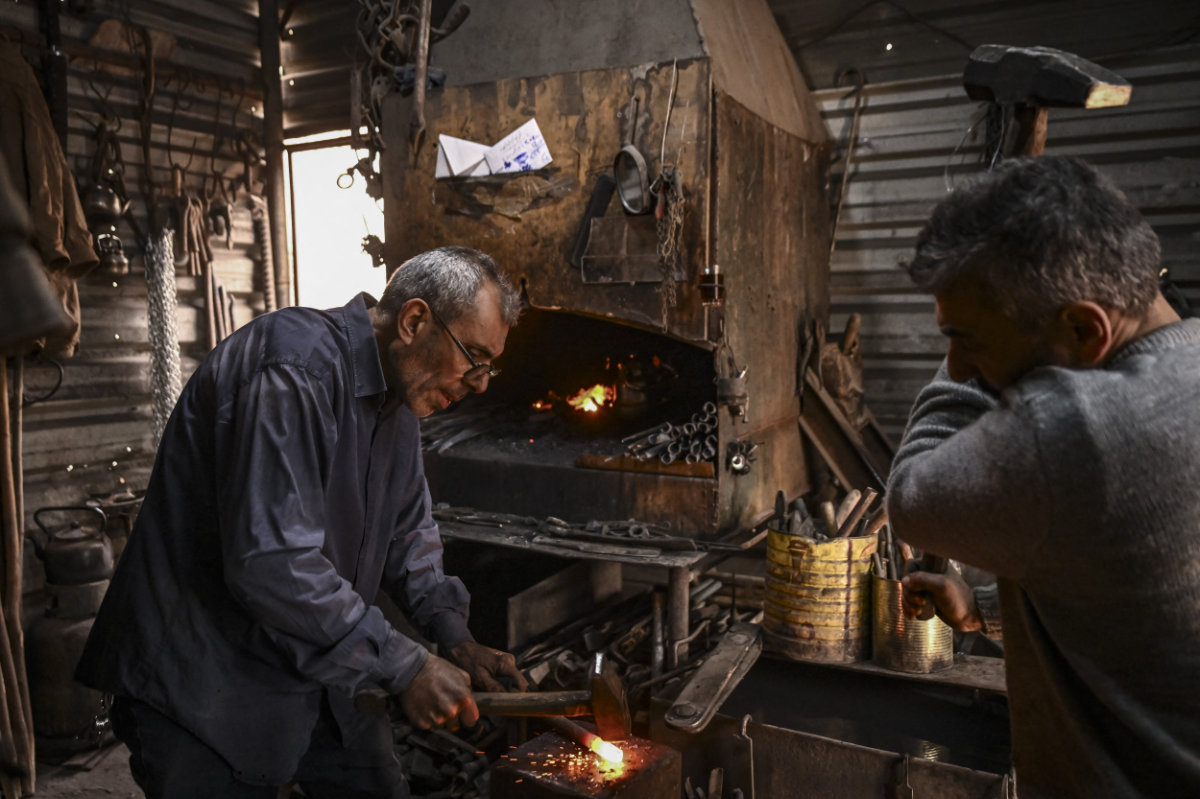
The drop in prices is partly due to a strengthening of the Syrian pound against the US dollar. On Friday, the dollar traded at 9,900 Syrian pounds, down from about 15,000 Syrian pounds before Dec. 8.
Syria expert Landis noted that while “food prices went down a bit once HTS took Damascus, because Turkish and foreign goods began to move freely into Syria without tariffs, bread prices went up.”
He added: “Bread is a major part of the Syrian diet, particularly for the 50 percent of Syrians facing food insecurity.”
Damascus residents told Arab News that a bundle of subsidized bread, which once cost 500 Syrian pounds, has seen its price jump to 4,000 Syrian pounds following Assad’s fall from power.
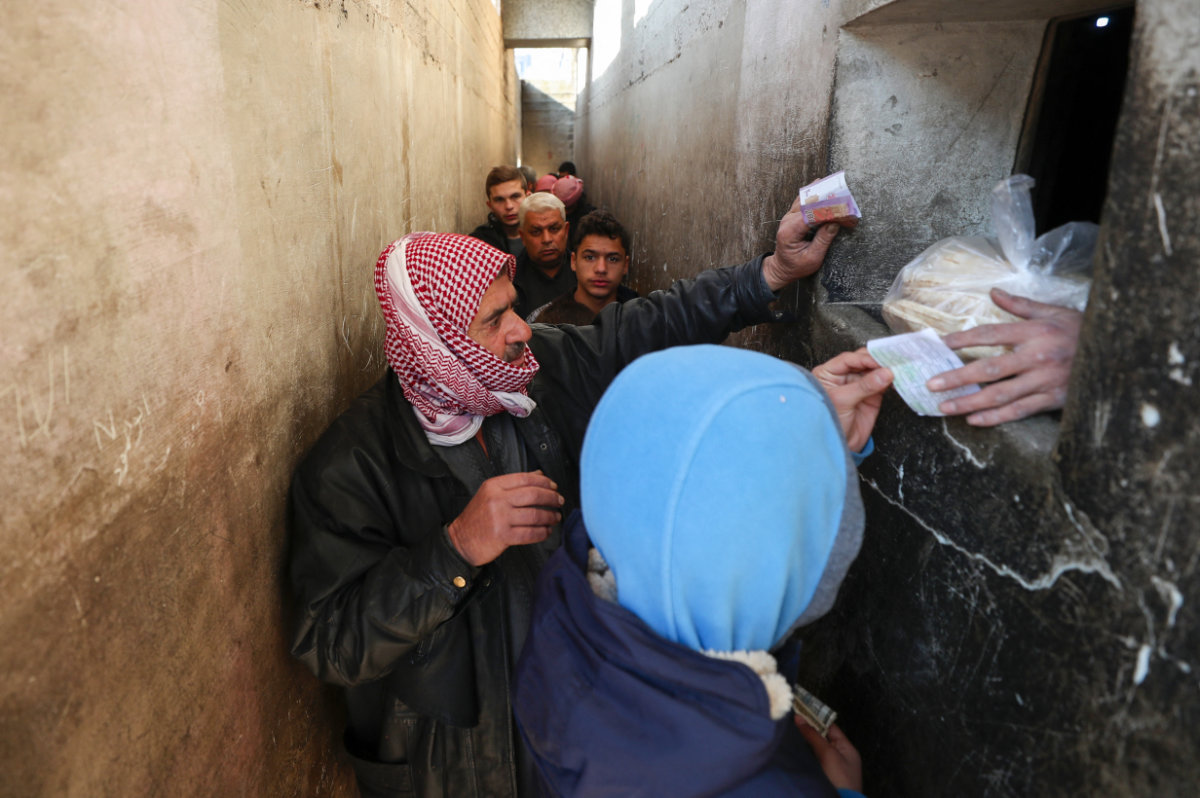
When many cannot afford this essential food item, the influx of Turkish and Western goods — much more expensive than local products — makes little difference. If anything, it serves as a stark reminder of the struggle many families face to meet their basic needs.
Yusra, a 33-year-old computer engineer from Muhajreen, an upscale neighborhood in central Damascus, said that although three members of her household of six are breadwinners, they still could not afford many food items, such as meat, fruit, and sweets.
“It doesn’t matter that we now have Snickers bars, Ulker cookies, or brie cheese in local supermarkets when most people can’t afford basic things like sugar or apples,” she told Arab News.
“In my family, whenever we have an occasion, be it a birthday or Eid, we have to cut corners to buy cake or meat.
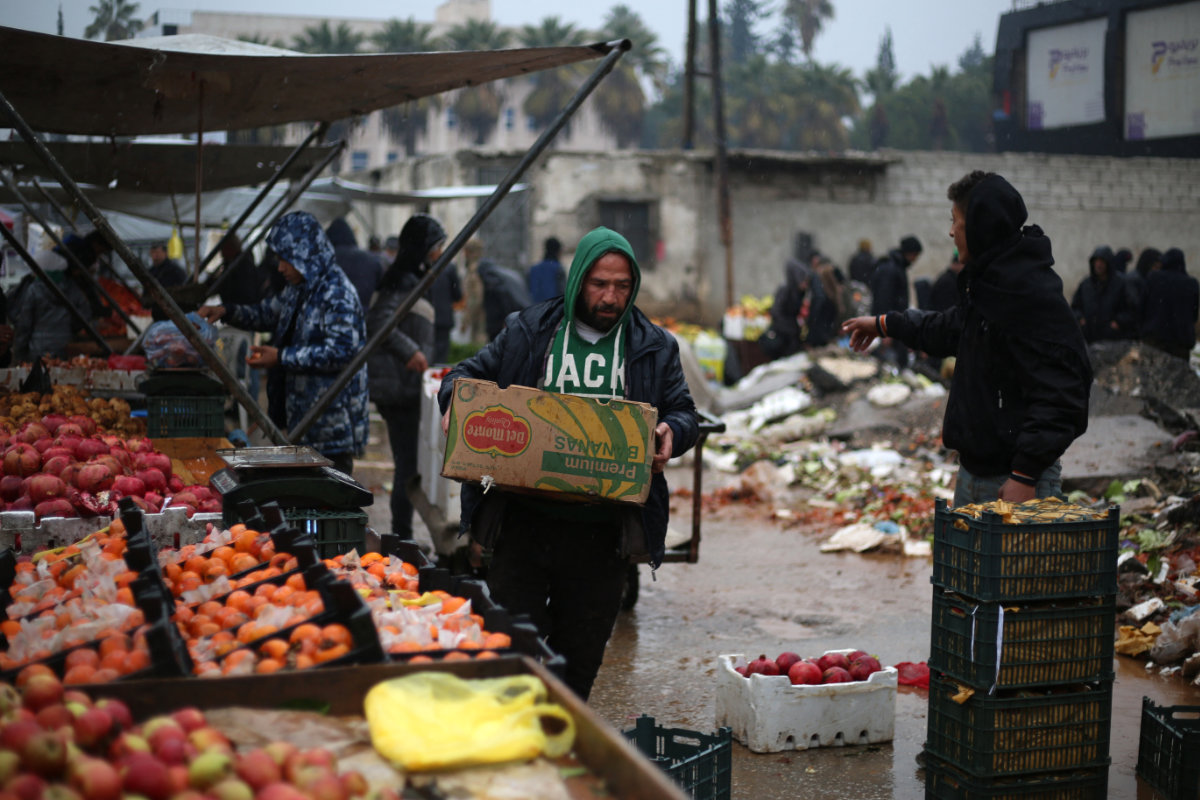
“My brother works for a private marketing company but has not received his salary for January as the business is struggling.”
But the problem goes beyond families’ inability to meet basic needs. WFP chief McCain called Syria’s hunger crisis a national and regional security issue, particularly during this critical transition period.
“What’s at stake here is not just hunger — and hunger is big enough. But it’s about the future of this country and how it moves forward into this next phase,” she told the Associated Press during her first visit to Syria in mid-January.
On the national level, Syria expert Landis warns that if the interim government led by President Ahmad Al-Sharaa fails to implement economic and political reforms, it will likely face growing opposition.
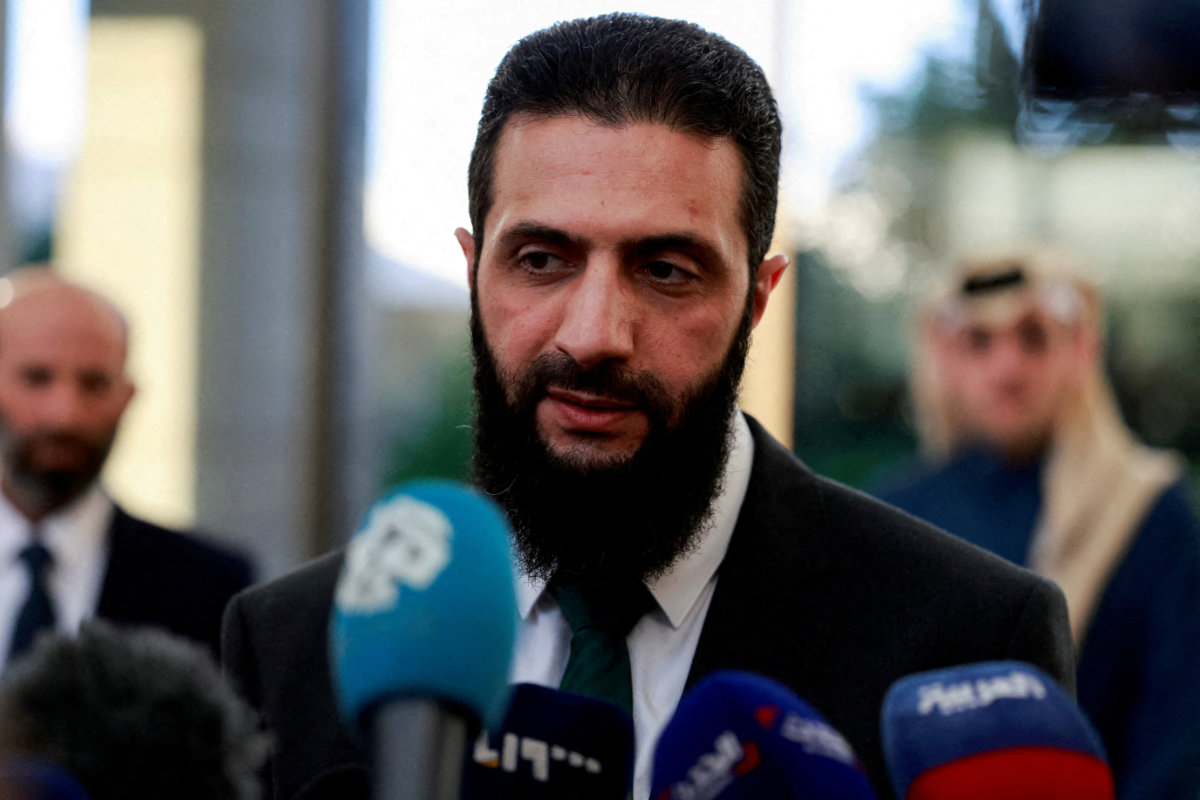
“Syrians are expecting the new government to jump start the economy, get the US and Western governments to lift sanctions, and to unite the country once again, which will mean that Syria’s oil and gas wells will once again be used by the Damascus government and not the Qamishli government,” he said, referring to the Kurdish-led Autonomous Administration of North and East Syria.
“It should be remembered that before 2011, oil and gas revenue provided 50 percent of the government budget. If President Al-Sharaa cannot get the economy back on its feet quickly, he is likely to face growing opposition and Syria is likely to remain turbulent and unstable.”

Since early December, protests have erupted across the country, with demands ranging from justice for disappeared activists to calls for improved public services and greater representation for various Syrian sects.
On the regional level, “a poor and hungry Syria will continue to pump out refugees,” Landis said. “All of Syria’s neighbors are counting on Syrian stability and economic growth to entice refugees to return home.”
He added: “If Syria stumbles, the reverberations will be felt throughout the region. The country will remain divided among foreign militaries and a battleground that could easily destabilize its neighbors.”
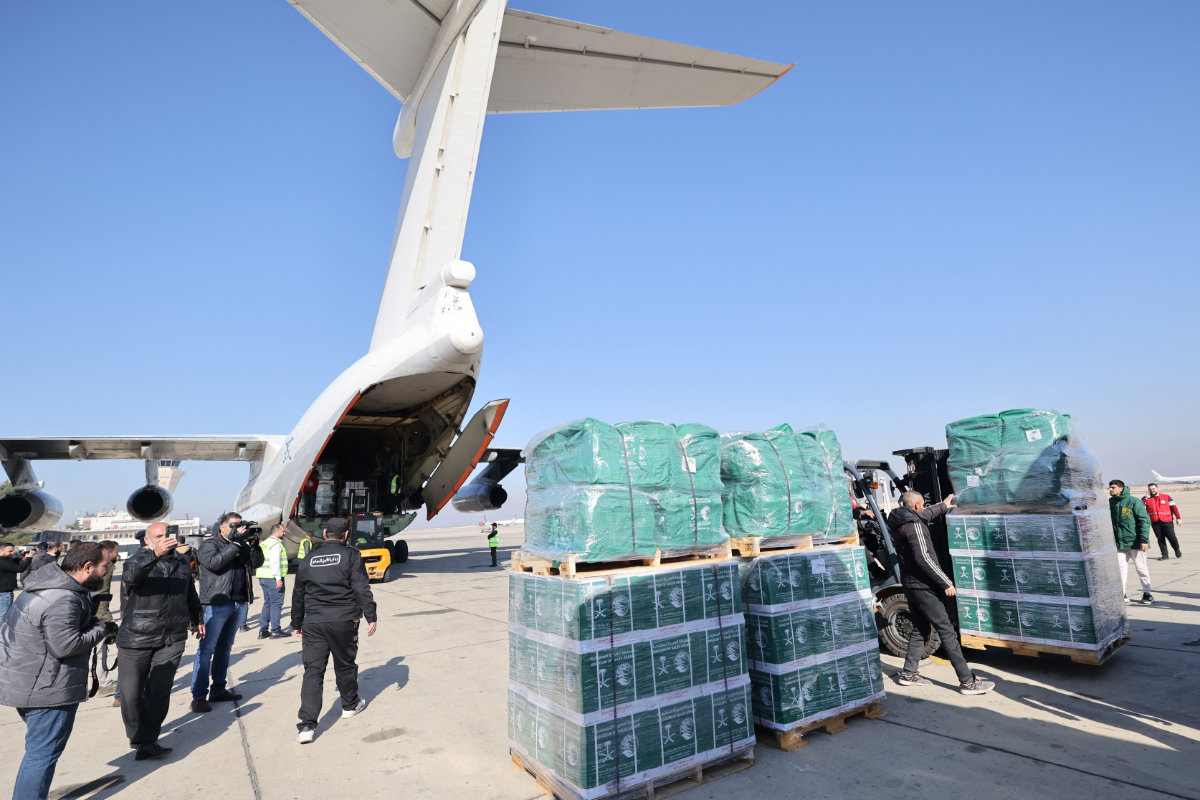
The UN warns that unless Syria achieves a stable transition, the hunger crisis will worsen, and reliance on aid will persist. The transition must establish inclusive governance, credible transitional justice, and stronger institutions to build public trust, according to ESCWA’s January report.
The report also states that the country’s stability and recovery depend on regional and international support, including sanctions relief and economic cooperation.
Without political and economic reforms in collaboration with regional and international partners, ESCWA believes Syria risks prolonged instability, further fragmentation, and becoming a haven for cross-border crime.

Netanyahu appoints Major General Eyal Zamir as Israel’s new army chief

- Zamir had served as the deputy chief of staff until 2021 and prior to that was head of the army’s Southern Command, which is responsible for Gaza
- Zamir replaces Lt. Gen. Herzi Halevi, who resigned in January
JERUSALEM: Prime Minister Benjamin Netanyahu named retired Major General Eyal Zamir as Israel’s new armed forces chief Saturday after his predecessor resigned last month taking responsibility for failing to stop Hamas’s October 2023 attack.
“Prime Minister Benjamin Netanyahu and Defense Minister Israel Katz have agreed this evening on the appointment of Major General (Res.) Eyal Zamir as the next chief of staff of the (Israeli military),” Netanyahu’s office said in a statement.
Zamir replaces Lt. Gen. Herzi Halevi, who resigned on January 21, two days after a fragile ceasefire took effect in Gaza which has now seen the release of 18 hostages by Hamas and its ally Islamic Jihad.
Zamir, 59, has been serving as defense ministry director general since 2023 and, according to Israeli media, he retired from the military after losing out on the top job to Halevi.
Zamir had served as the deputy chief of staff until 2021 and prior to that was head of the army’s Southern Command, which is responsible for Gaza.
As head of Southern Command, Zamir led efforts to “thwart offensive terror tunnels penetrating from the Gaza Strip into Israeli territory,” according to the defense ministry.
Halevi said in his resignation letter that he was stepping down “due to my acknowledgement of responsibility for the (military’s) failure on October 7, (2023),” but added that he was leaving at a time of “significant successes.”
Shortly after Halevi’s announcement, the wartime head of Southern Command, Major General Yaron Finkelman, too resigned over the military’s failings in 2023.






















